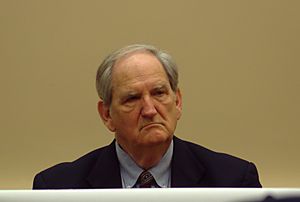Bob Smith (New Hampshire politician) facts for kids
Quick facts for kids
Bob Smith
|
|
|---|---|
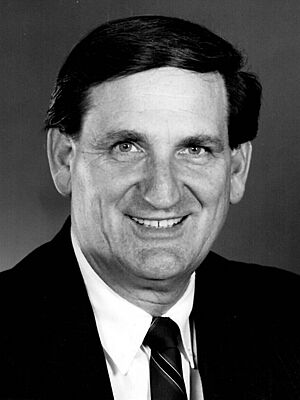 |
|
| United States Senator from New Hampshire |
|
| In office December 7, 1990 – January 3, 2003 |
|
| Preceded by | Gordon J. Humphrey |
| Succeeded by | John E. Sununu |
| Chair of the Senate Environment Committee | |
| In office January 20, 2001 – June 6, 2001 |
|
| Preceded by | Harry Reid |
| Succeeded by | Jim Jeffords |
| In office November 2, 1999 – January 3, 2001 |
|
| Preceded by | John Chafee |
| Succeeded by | Harry Reid |
| Chair of the Senate Ethics Committee | |
| In office January 7, 1997 – November 2, 1999 |
|
| Preceded by | Mitch McConnell |
| Succeeded by | Pat Roberts |
| Member of the U.S. House of Representatives from New Hampshire's 1st district |
|
| In office January 3, 1985 – December 7, 1990 |
|
| Preceded by | Norman D'Amours |
| Succeeded by | Bill Zeliff |
| Personal details | |
| Born |
Robert Clinton Smith
March 30, 1941 Trenton, New Jersey, U.S. |
| Political party | Republican (before 1999, 2000–present) |
| Other political affiliations |
Constitution (1999) Independent (1999–2000) |
| Spouse |
Mary Jo Hutchinson
(m. 1966) |
| Children | 3 |
| Alma mater | Lafayette College (BA) |
| Military service | |
| Allegiance | United States |
| Branch/service | |
| Years of service | 1965–1967 (Active) 1962–1965, 1967–1969 (Reserve) |
| Battles/wars | Vietnam War |
Robert Clinton "Bob" Smith (born March 30, 1941) is an American politician. He represented the state of New Hampshire in the U.S. government for many years. First, he was in the United States House of Representatives from 1985 to 1990. Then, he served as a U.S. Senator from 1990 to 2003.
Smith was a member of the Republican Party. He was known for his conservative views. In 1999, he decided to run for President of the United States. He briefly left the Republican Party to try and get the nomination from other parties. He later rejoined the Republicans.
After his time in the Senate, Smith moved to Florida. He tried to run for the Senate from Florida but was not successful. He later moved back to New Hampshire and ran for the Senate again in 2014, but he did not win his party's primary election.
Contents
Early Life and Education
Robert Smith was born in Trenton, New Jersey. His parents were Margaret and Donald Smith. He went to Lafayette College and earned a bachelor's degree in 1965. After college, he served in the United States Navy. He was on active duty for two years, including one year in Vietnam.
After his military service, Smith moved to Wolfeboro, New Hampshire. There, he worked as a history and English teacher. He also served on the local school board and started a real estate business.
A Career in Politics
U.S. House of Representatives
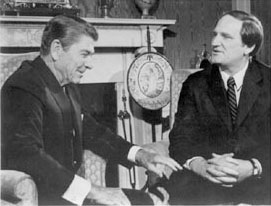
In 1982, Smith first ran for a seat in the U.S. House of Representatives but lost. He ran again in 1984 and won. This was partly because President Ronald Reagan was very popular that year, which helped other Republican candidates win their elections.
Smith was re-elected to the House in 1986 and 1988 by large margins. He served New Hampshire's 1st congressional district.
U.S. Senate
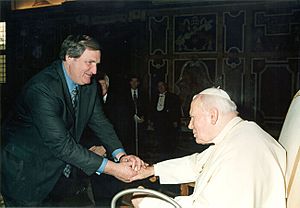
In 1990, Smith decided to run for the U.S. Senate instead of the House. He won the election easily. The senator he replaced, Gordon J. Humphrey, resigned a few weeks early, so Smith was appointed to start his Senate term right away.
In the Senate, Smith became very involved in the Vietnam War POW/MIA issue. This issue was about finding out what happened to American soldiers who were missing or captured during the Vietnam War. This was a personal cause for him because he never knew how his own father died in World War II.
Smith was re-elected to the Senate in 1996, but it was a very close race. During his time as a senator, he was known as one of the most conservative senators from the northeastern United States. He held strong views on many social issues.
Running for President
In 1999, Smith announced he was running for President. He first tried to become the Republican nominee. When his campaign didn't get much support, he left the Republican Party. He then tried to run with the Taxpayers' Party (now the Constitution Party) and later as an Independent.
A few months later, he dropped out of the presidential race completely. He decided to support George W. Bush, who was the main Republican candidate.
Return to the Republican Party

Around the time Smith ended his presidential campaign, a powerful position in the Senate opened up. It was the chairmanship of the Senate Committee on Environment and Public Works. To get this position, Smith rejoined the Republican Party. He said that leaving the party had been "a mistake." He was then chosen as the committee's chairman.
Some people in New Hampshire were not happy with Smith's actions, like switching parties. In 2002, when he ran for re-election to the Senate, he lost in the Republican primary election to John E. Sununu. After this defeat, Smith moved to Florida and began selling real estate.
Life After Congress
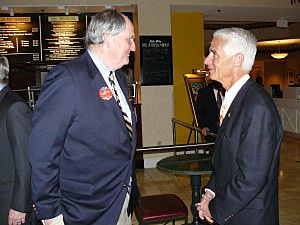
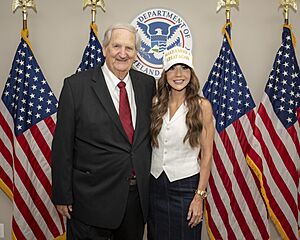
After leaving Congress, Smith stayed interested in politics. In 2004, he briefly ran for a U.S. Senate seat in Florida but dropped out because he had little support. He considered running again in 2010 but also dropped out of that race.
In 2013, Smith moved back to New Hampshire. He decided to run for the Senate one more time in the 2014 election. He lost the Republican primary to Scott Brown, a former senator from Massachusetts.
Political Views
Smith was known as a strong conservative. During his time in government, he supported laws that aligned with his conservative beliefs. For example, he was a strong supporter of the right to own firearms. He introduced a bill in 2001 that would have made it easier for people with a license to carry a concealed firearm in different states.
He was also a witness to the CIA headquarters shooting in 1993. This event influenced his views on security and law enforcement.
Personal Life
Bob Smith is married to Mary Jo, and they have three children: Jennifer, Robert, and Jason. He is a Roman Catholic.
See also
- List of American politicians who switched parties in office
- List of United States senators who switched parties
 | George Robert Carruthers |
 | Patricia Bath |
 | Jan Ernst Matzeliger |
 | Alexander Miles |



